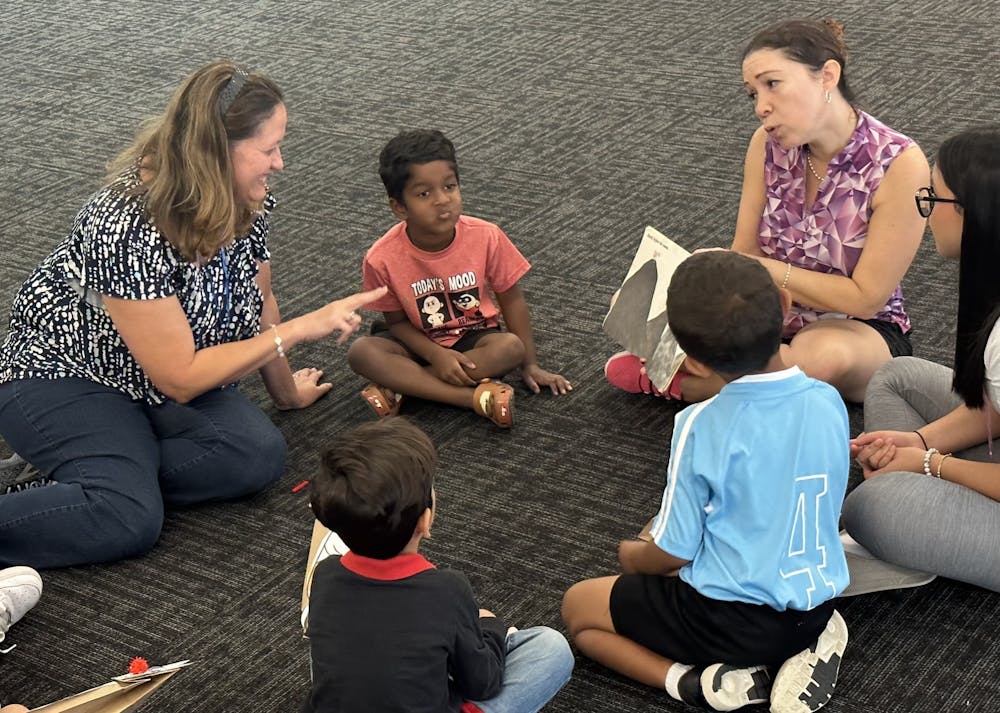On Oct. 21, children holding handmade mouse puppets sat in a circle around a mother holding a thin book. She showed them all the cover and title, “De Quién Eres, Ratoncito?” (“Who are you, little mouse?”) flipped to the first page and began reading in Spanish.
The Latina Women’s League has hosted its weekly “Storytime in Spanish” event series every year since 2006 between September and April. This year, they meet on Saturdays from 10:30 to 11:45 a.m. at the Tower Road Public Library to read a new story.
Ericka Ghersi is the 51-year-old league president whose goal with the weekly readings is to spread the Spanish language through language immersion.
“We want them to see that there is a community here that speaks Spanish and that they’re not embarrassed to speak Spanish,” Ghersi said.
The league focuses on teaching children to take advantage of the brain’s natural linguistic plasticity early on. As one ages, learning a new language becomes increasingly demanding, Ghersi said. The best time to learn is during childhood.
Aside from facilitating the learning of Spanish, learning multiple languages early on can assist in other areas. Hind Majeed, a mother at the event and trilingual speaker of English, Arabic and Polish, described why she brings her children to read in Spanish.
“The rewiring of the brain when you learn the language is going to help you with subjects [such as] communication skills,” Majeed said. “I think humanity lives on communication, and when we miscommunicate with each other, there [are] problems.”
While the volunteers read to the children in Spanish, they are only encouraged, not forced, to reply in Spanish. Because the program is open to all families regardless of linguistic background, the immersion helps the children integrate with different languages and cultures.
Sravanthi Kolli, another mother at the event and a trilingual speaker of English, Telugu and Hindi, finds value in multilingual immersion due to her upbringing.
“At school, they taught me three languages from when we were kids,” Kolli said. “That's why it's so easy for us to learn another language. That's why I want to get my son into the multilingual thing.”
After reading, volunteers entertain the children while members of the league speak with mothers to share vital resources. The goal is to expand the learning from the hour at the library to the home, from video readings of online books to worksheets that build on basic Spanish skills. For families that cannot make the event, Ghersi shares recordings of the group reading each week.
The league has found difficulty reaching all mothers due to staffing limitations.
“There’s a group of mothers that want us to do [“Storytime in Spanish”] another day, but we can’t because our volunteers are teachers that work Monday to Friday,” Ghersi said. “It’s an obstacle that’s always present because we don’t have the people that want to do it during the week.”
The goal of the Latina Women’s League, as a whole, is to empower the Latina community through education, culture and leadership opportunities.
“Storytime in Spanish” is one of six education-based initiatives that the Latina Women’s League hosts throughout the year. The other events are English classes for noncitizens, an immigrant information program for the undocumented, health screenings and workshops, a book club and the yearly Latino Film Festival that runs during Hispanic Heritage month.
While the league educates those who attend its events, its volunteers benefit by working with the children. Lizzie Rodriguez-Rios, a 54-year-old Spanish teacher at Gainesville High School and member of the Latina Women’s League, finds value in the organization for her students.
“I emphasize offering volunteer work for our students,” Rodriguez-Rios said. “Most of all, those that speak Spanish and can read in Spanish to the children every weekend.”
The Latina Women’s League has 100 volunteers and 52 members. While volunteers are allowed to attend workshops, becoming members grants them access to the community network, the members-only book club and other opportunities that arise.
Kelly Aguila Casales, one of the volunteers at the event, values her work with the league.
“I had never volunteered before, never had a job,” Aguila Casales said. “They made me pull weeds, taught me how to do things well. It’s an excellent experience.”
Contact Eluney Gonzalez at editor@alligator.org. Follow him on Twitter @Eluney_G.





